
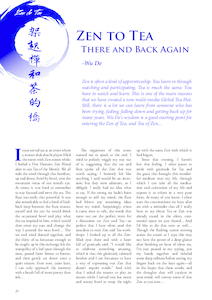 |
|
茶 的 橋
I once served tea at an event where a master shakuhachi player filled the room with Zen noises whilst I boiled a Five Element Zen Blend akin to our Tea of the Month. We all rode the wind through that bamboo, up and down, bowl by bowl, over the mountain vistas of our mind's eye. At times, it was hard to remember to stay focused and serve the tea. The flute was really that powerful. It was also remarkable to feel a kind of feedback loop between the flute master, myself and the tea: he would drink the occasional bowl and play what the tea inspired in him, which would then enter my ears and change the way I poured the next bowl... The tea and wind danced together, and the thirty of us fortunate enough to be caught up in this exchange felt the tranquility of a leaf spun through the trees, passed from breeze to breeze, and then gently set down onto a quiet stream. Even now, years later, I can only approach the memory with a brush full of more poetry than ink...
The organizers of this event wanted me to speak at the end. I tried to politely wiggle my way out of it, suggesting that the tea and flute spoke all the Zen that was worth saying. I honestly felt like anything I said would be an intrusion; but they were adamant, so I obliged. I really had no idea what to say. If the strong tea hadn't been enough to still my mind, the flute had blown any remaining ideas from my mind. Surprisingly, when it came time to talk, the words that came out are the perfect intro for a discussion on Zen and Tea - so perfect that I have often used this anecdote to start Zen and Tea workshops. I looked up at all the Zenfilled eyes there and with a heart full of gratitude said, "I would like to celebrate something amazing, which is that this gloriously talented brother and I are fortunate to have a way of expressing our Zen that doesn't require words." And with that I asked the master to play an encore while I served one last sweet and watery bowl to wrap the night up with the same Zen with which it had begun.
Since that evening, I haven't lost that feeling. I often pause to smile with gratitude for Tea and the grace that brought this wonderful medium into my life, through which I can take all the meditation and cultivation of my life and express it to others in a very pure form. As many of you know, I often start the conversations we have after tea with a reminder that all I really have to say about Tea or Zen was already stated in the silent, ceremonial space we just shared... And I'd like to do that now as well... Though the flashing cursor moving across the screen as I type this may not have the power of a deep glance after finishing an hour of silent tea, I've just paused in my typing, put my hands together and inhaled some deep stillness before setting my fingers back on the keys again - all in the hopes that these words, and the thoughts they will catalyze in your mind, will convey some of that Zen to you now...
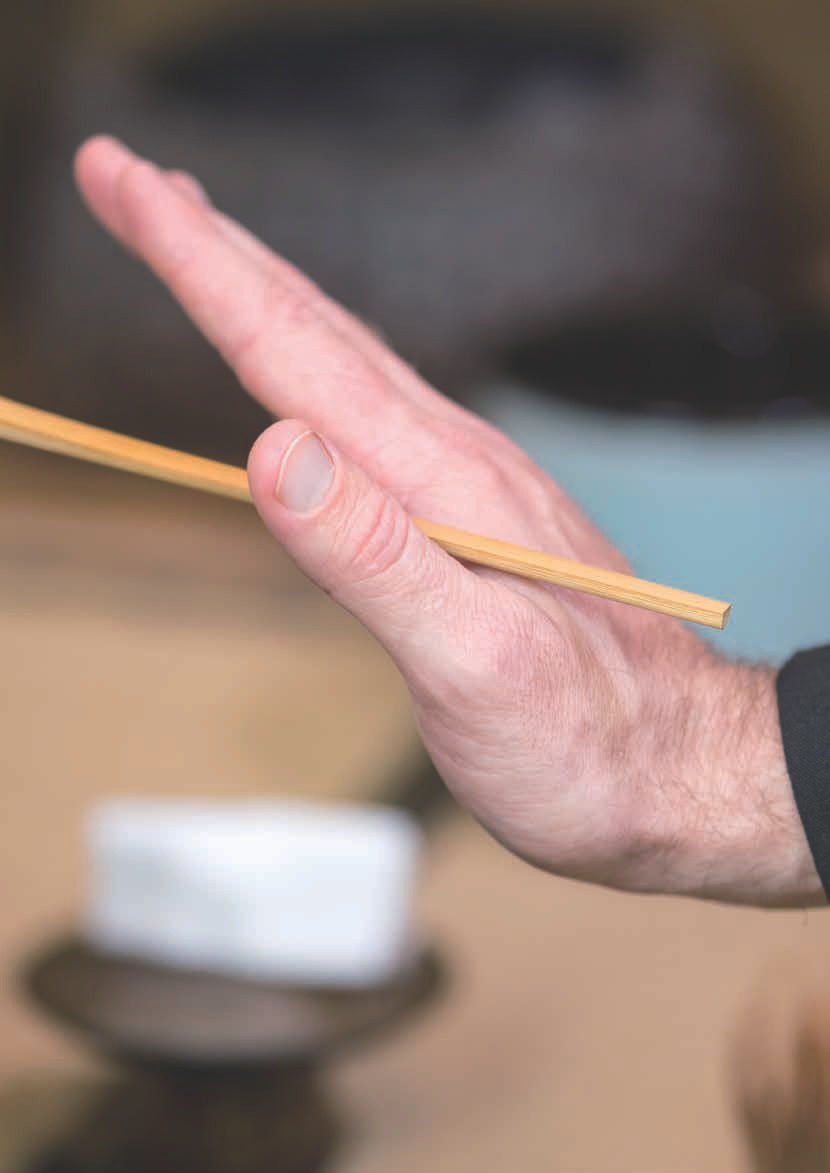
The Way of Tea - Follow it, and ever deeper it leads on; Like the endless fields of Musashi, Where the moon is most lucid, Its depths draw us onwards.
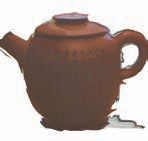 Watch the Zen and Tea video now!
Watch the Zen and Tea video now!In the West, we often think of Zen as a kind of Buddhism. It can be thought of in that way, but it isn't just that. "Zen" is the Japanese word for the Chinese "Chan," which was pronounced "Tsan" in the south of China and then translated to "Zen" in Japanese. The word "Chan" is also a translation, so you actually have to follow the etymology back to Sanskrit to understand its essence. "Chan" is how the Chinese translated "dhyana," which is at best understood as "the meditative mind." It's actually deeper than that, but "meditative mind" will do. So "Zen" is the meditative mind. Besides the etymology of the word "Zen," we can also look to the origin myth of Zen in order to further the idea that Zen is not just a religion or kind of Buddhism, but that, in its pure form, it is the meditative mind itself. Zen traces its origin back to a time when the Buddha held up a lotus instead of giving a teaching and something unspoken was transmitted through that flower to 25/ Zen to Tea his student Mahakasyapa, who was enlightened. (It is interesting to note that the Buddha also did not teach Buddhism. The word "Buddhism" was first used by a British author in the beginning of the nineteenth century. Asian society traditionally didn't have the strong sense of religious affiliation or identity that is prevalent in the West. Even today, people often see no harm in praying at Buddhist, Daoist and folk/Nature temples, as well as visiting a church on Sunday.)
There are four foundations of Zen, and in contemplating them, you may see why tea has played such an important role in the Zen tradition over the centuries:
不 立教 文 外直 字 別指 見 轉人 性 心 成 佛
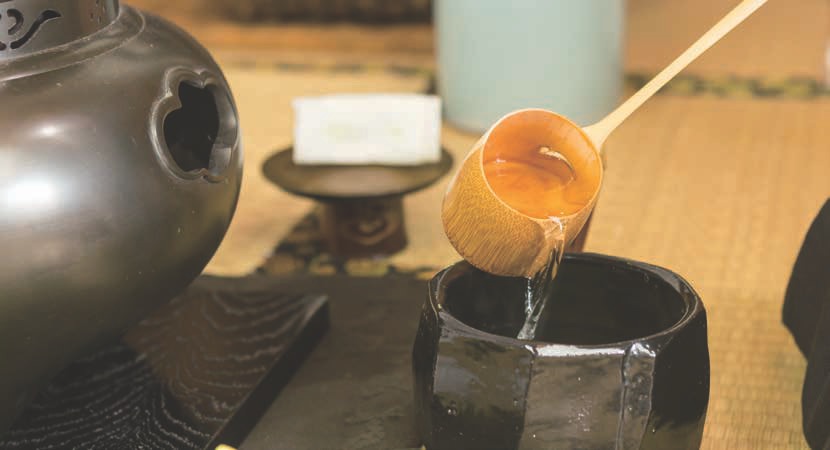
Since the transmission is non-verbal, and not doctrinal or dogmatic, Zen is a difficult thing to share, or even talk about. Zen Buddhism can be a basket that carries and encourages Zen (the meditative mind), but it can also get in the way. "Religion often hinders the religious experience," as Osho often said. For that reason, Zen masters have always used art as a tool to encourage transmission and awakening, as often as they've used more traditional Buddhist practices like chanting, scripture, philosophy or other life teachings. The martial arts were born in this way. Calligraphy, painting, poetry and music - like the flute of my session - have all been used to transmit Zen over the centuries. But no teacher has spoken as prolifically on Zen as Tea!
Tea has sat between master and student for millennia. And there's an easy experiment you can do to understand why. It's really simple: in the middle of a session, switch brewers! Same tea, water, same teaware, but different brewer. I am going to spoil the experiment and state the obvious (But you should still try it, in order to understand yourself. Don't take my word for it!): The tea is very, very different. The heartmind of the brewer influences the tea. This should come as no surprise. We can hand two different musicians the same sheet of music, and even the same exact instrument, and they will play two very different versions of the song. In art, the creation comes out saturated by the colors of our soul, like water passed through a freshly dyed cloth.
Once you understand that the brewer influences the tea more than the water, teaware or brewing methodology (not just because you read it here, but because you tried the experiment), then you can begin to understand why tea has been so important to teacher/student relationships throughout history. If the mind of the brewer is in the liquor, then what could be more poignant than for the student to literally and metaphorically consume the teacher's mind? There could be nothing more Zen. And this works the other way, too: the student makes tea and offers their heart-mind to the teacher, an acceptance of which symbolizes a taking of that student into the tradition.
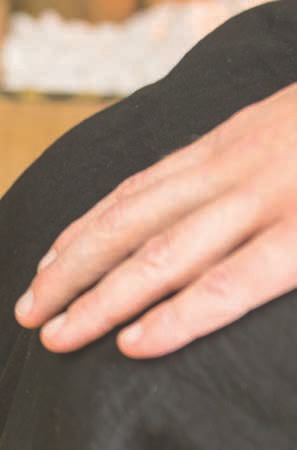
The second foundation of transcending dogma, doctrine or philosophy is actually one of the most endearing aspects of tea. If you invite a Buddhist, Hindu, Christian and Muslim into a room to discuss their worldviews, chances are they will argue. But if they go into that same room to drink and discuss tea, they will emerge brothers. I have seen it happen! This is a huge measure of the gratitude I expressed at that shakuhachi gathering, and every time since: that I can express my heart, free of any ideas or concepts. Language can be a barrier, because it represents ideas and concepts, so the listener/reader can either agree or disagree, believe in or not believe in the ideas expressed. As I write this article on Zen, I know that some of my readers will agree with it all, some will agree with a portion and disagree with other parts, while still others of you will disagree with it all. (You know who you are!) But when I make tea, I can express my heart free of doctrine or philosophy. And while you could say you don't want the bowl of tea I offer you, it would be absurd to say that you don't agree with or don't believe in it. You don't agree with a bowl of tea; you drink it!
Tea is moving meditation. It is devotion in motion. And that is another reason that Tea and Zen are one flavor. Tea encourages, leads into and then expresses the meditative mind, which is Zen. It is a meditative bridge that acts as an ally to those trying to begin a meditation practice, as well as to the seasoned meditator looking to further the meditative mind in their life. Tea is a bridge built of Zen.
Over years of meditation I have come to find that I really don't have mindfulness issues. Like most people, I once complained that I couldn't remember to be mindful, hoping to find practices that would help me be more mindful throughout the day. But then, one day, I realized that I have a great capacity for mindfulness, as does everyone. I learned this by watching the concentration habits of my young students (I was once a school teacher). I realized that when they had respect for something, they naturally and easily became focused and mindful and that this sometimes would even last for longer periods than what you would ordinarily think possible for small children. It dawned on me that I didn't have mindfulness problems; I had respect problems! And it is easy to have respect challenges in a world where everything is mass-produced by companies that don't respect the Earth, or even their customers - by workers who don't love or respect what they do. Things are made to be used and discarded these days, not respected. Through tea I rediscovered my respect for all areas of my life, and my mindfulness - my Zen.
My teacher used to say that you can tell everything about a student's Zen by watching the way they treat their shoes. I would say the same about tea: you can tell a Chajin's relationship to tea by the way they treat their cups and bowls, pot and kettle, and even the tea they jar for later. This doesn't mean you need to buy the nicest, most expensive teaware. That is just one way of showing respect. But in finding your respect for tea as plant medicine, for the guest if you are the host, or host if you are the guest, you will have found the mindful, sacred center of tea - the place where tea and Zen meet. With respect, a tea practice naturally leads into the feeling of sacred, the still place in the center of the heart. The transformative magic of a tea session is dependent upon this respect, like most all relationships one has in life.
Aside from respect for guest and host, respect for tea as plant medicine and for one's teaware, there is also respect for the practice itself. Never underestimate the power of repetitive practice! We are creatures of habit. We learn through repetition. And when it comes to a moving meditation like tea, there are many subtle changes that come from brewing the tea upright, with intention and mindfulness day after day, month to month and even for years. Muscles change, energy begins to flow differently, and you may even see the world differently. This is taking the tea bridge from life to Zen.
The bridge also leads from Zen to Tea. As meditators, we often find a strange sense of dichotomy developing over years of practice, in which you are peaceful on the cushion, but feel as though much more of the insight cultivated in meditation could somehow be translated into your daily life. I've certainly felt this way. Sometimes you lose all your meditation in a moment's anger, for example. If you already have a meditation practice, you will find that tea facilitates the meditative mind in daily life. If you prepare tea after meditation, you may find that more of the insights and transformations realized on the cushion start to find their way into your day. As you move through the ordinary activity of preparing tea with a meditative mind, you learn to bring that mind to other activities as well. And this is the secret to having more Zen in your life. The key to being more spiritual is not necessarily in doing more of a particular activity like yoga or seated meditation. That may work. But ultimately, the real way to make your life more spiritual is to start doing more things with sacred intention. Walking up and down stairs, brushing you teeth, eating - these can all be meditations! And tea encourages this. Through this practice, I find myself closer to living the way I long to. I am closer to the one I wish to be.
Let's have one more bowl... Before we wrap up this session, and with your permission, I thought I'd share my three favorite aspects of Zen, and why I have devoted so much of my life to a Zen practice and way of life. The first thing I love about Zen is its irreverence. For ixample, there is a tradition of writing witty graffiti on scriptures, like Hakuin's commentary on the Heart Sutra. This is something very powerful. Zen is special for not only publically acknowledging, but celebrating its own limitations. There is a very real way in which this thing we call Zen is not the "it" we are seeking, nor even the "it" we are learning from. Zen is not what we are looking for. It may show the way to the truth, but it isn't the truth. One of my favorite Zen sayings demonstrates this: "Zen is a stall selling water by a river."
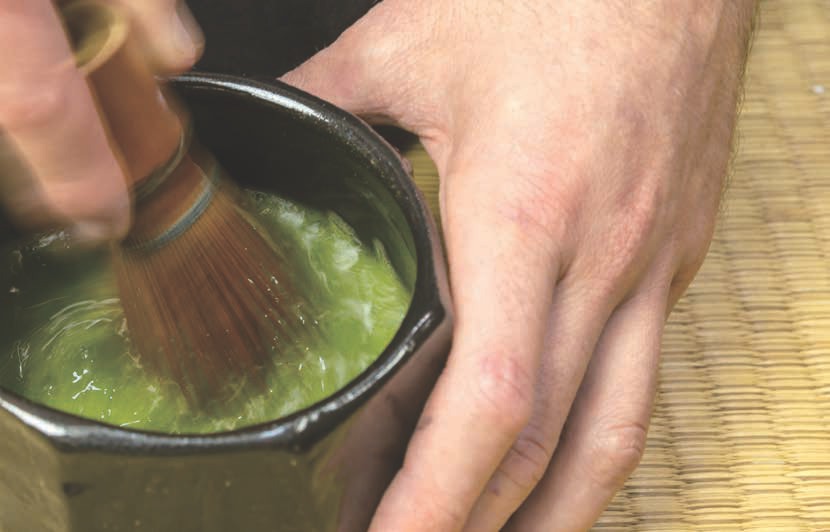
The truth is all around us. And our minds, our ideas and philosophies - our explanations of our world - are all a part of this world, but they aren't to be confused with it. The finger pointing at the moon is not the moon. All views are provisional. The scientific method demands that. You cannot understand the way things are, only how they are now as seen through the limitations of whatever lens you are looking through. Later, others may have a better lens and see things from a clearer perspective. Science grows and expands upon itself in this way, and so does Zen.
And that brings me to the second thing I love most about Zen, which is that, like science, it never stops growing. If you remember the foundations of Zen we discussed earlier, you can see that the third and fourth principles of Zen put the focus on experiential truth. With such an emphasis on experiential wisdom, Zen has always encouraged new expansions and expressions of truth. In other words, there is a never-ending stream of new Zen literature and some of it is as good as the great scriptures of old. I am as inspired by Shunryu Suzuki's books as I am by the Platform Sutra of Hui Neng. In some ways, Suzuki's modern work is even a better read, as it is not as difficult to understand and perhaps helps me to better understand how to live a life of Zen in the modern world. Since the emphasis is not on a particular dogma, doctrine or scripture, Zen encourages any expression that facilitates the meditative mind, and that means an up-to-date flow of poetry, calligraphy, art and scripture, ancient to modern.
Finally, the thing I love most about Zen is that, as this article has demonstrated, there are always many and more excuses to drink tea. I love that tea helps me to find the meditative mind when I have lost my respect for the world. And I also love that once I am centered, I can then use tea to express my meditative experience to others. If they weren't serving so much tea, I never would have found my way into a Zen center...
